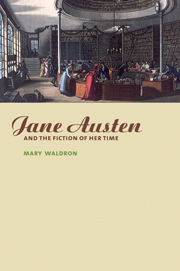Book contents
- Frontmatter
- Contents
- Acknowledgements
- Texts and abbreviations
- Introduction
- 1 The juvenilia, the early unfinished novels and Northanger Abbey
- 2 The non-heiresses: The Watsons and Pride and Prejudice
- 3 Sense and the single girl
- 4 The frailties of Fanny
- 5 Men of sense and silly wives – the confusions of Mr Knightley
- 6 Rationality and rebellion: Persuasion and the model girl
- 7 Sanditon – conclusion
- Notes
- Bibliography
- Index
6 - Rationality and rebellion: Persuasion and the model girl
Published online by Cambridge University Press: 22 September 2009
- Frontmatter
- Contents
- Acknowledgements
- Texts and abbreviations
- Introduction
- 1 The juvenilia, the early unfinished novels and Northanger Abbey
- 2 The non-heiresses: The Watsons and Pride and Prejudice
- 3 Sense and the single girl
- 4 The frailties of Fanny
- 5 Men of sense and silly wives – the confusions of Mr Knightley
- 6 Rationality and rebellion: Persuasion and the model girl
- 7 Sanditon – conclusion
- Notes
- Bibliography
- Index
Summary
Of all six completed novels Persuasion most resists a late twentieth-century reader's attempts to exonerate Austen from charges of prescriptiveness and didacticism. If Anne Elliot was ‘almost too good’ for the author, a reading based on an assumption of Austen's attachment to conventional contemporary wisdom will certainly leave her too good for us. Marilyn Butler, among others, avers that ‘Anne comes near to being dangerously perfect’ and much modern criticism finds her somewhat tediously fault-free. Curiously, though, it is the one work of Austen's which attracted prompt contemporary criticism on moral grounds; in 1818 the following was included in a review in The British Critic:
[The novel] contains parts of very great merit; among them, however, we certainly should not number its moral, which seems to be, that young people should always marry according to their own inclinations and upon their own judgement; for that if in consequence of listening to grave counsels, they defer their marriage, till they have wherewith to live upon, they will be laying the foundation for years of misery, such as only the heroes and heroines of novels can reasonably hope ever to see the end of.
These two attitudes, nearly two hundred years apart, provide us with a bewildering paradox – is the novel supporting or rejecting contemporary rules of conduct? What was Austen up to in Persuasion?
- Type
- Chapter
- Information
- Jane Austen and the Fiction of her Time , pp. 135 - 156Publisher: Cambridge University PressPrint publication year: 1999



